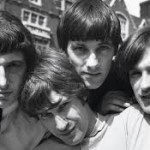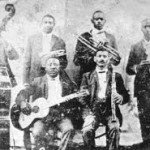For the rest of our lives, we will all remember where we were on September 2, 2014, when we heard that the Russian Sex Geckos had died in space. These randy reptiles, who sacrificed their lives to make the vast emptiness of the cosmos safe for Astral Coitus, will forever be in our hearts, alongside other non-human pioneers who climbed the ladder to heaven for the sake of ethereal exploration: Laika the Canine Cosmonaut, Bek and Lek the Lunar Orbiting Tortoises, and ill-fated Gordo the Squirrel Monkey, launched by our very own country into the skies in December, 1958, only to drown without mercy when the capsule parachute failed to open.
(Sans pitié, I tell you, sans pitié! Wishing only for a warm nut and a cool patch of Florida grass to scamper upon, poor Gordo was sacrificed to the cruel, cold waters of the Atlantic.)
The brevity of the brave lives of the Sex Geckos and all the other dogs, rodents, chimps, and turtles who died for science has made me consider what a luminous, brief, and rare gift life is. Inspired by the lives these skybound creatures led, scraping the heavens to gaze with hopeful and tiny animal eyes at the face of God, I have decided to honor their sacrifice and the brief moments of joy, heroism, and lizard horniness they must have felt before the Space Reaper collected his pennies. To honor the extraordinary gift of sentient birth, full of the dust of destitution and the silver of desire, the glitter of cities and the sun-rich, loamy earth of the country, the prize of solitude and the sweet grasp of company, here is my list of things I am thankful for:
 Fribbles. During the unsightly, bullying, hirsute, bloated, screeching, neon decade of the 1970s, I lived in the weak-Tudor suburbs of Long Island, that land of car dealerships, mod synagogues, and over-designed duck ponds; I screamed majorly, minorly, and hourly for the scratch and sass of Manhattan, dreaming every day of escape from the eternal wet November of the well-meaning Freeway Land. In the midst of this doomscape of blousy hair and teenage Porsches, the succulent succor of the Fribble, that delectable Delorean of ice cream treats, was like Mothers’ milk to the teen soul abused by the encroachment of conformity and mediocrity. Likewise, I am thankful for…
Fribbles. During the unsightly, bullying, hirsute, bloated, screeching, neon decade of the 1970s, I lived in the weak-Tudor suburbs of Long Island, that land of car dealerships, mod synagogues, and over-designed duck ponds; I screamed majorly, minorly, and hourly for the scratch and sass of Manhattan, dreaming every day of escape from the eternal wet November of the well-meaning Freeway Land. In the midst of this doomscape of blousy hair and teenage Porsches, the succulent succor of the Fribble, that delectable Delorean of ice cream treats, was like Mothers’ milk to the teen soul abused by the encroachment of conformity and mediocrity. Likewise, I am thankful for…
 The Kinks. Before Punk saved our souls and turned all us Sauls into Pauls spreading the gospel of Bowery and Kings Road to a world dulled by Kansas and ELP, us wet-lipped outsiders who wandered in the cruel American desert bowed low before the golden calf of The Kinks, those delicious, British, bashing, effeminate, tender, terrorizing masters of songs most subtle and riffs most outrageous. They had a legend full of gorgeous back-story and self-destructive misery, making music for every mood and a song for every season, and they provided an immediate way to identify allies before the armies of the outsiders all cut their hair. Oh my Kinks, you were my first love. I am thankful for…
The Kinks. Before Punk saved our souls and turned all us Sauls into Pauls spreading the gospel of Bowery and Kings Road to a world dulled by Kansas and ELP, us wet-lipped outsiders who wandered in the cruel American desert bowed low before the golden calf of The Kinks, those delicious, British, bashing, effeminate, tender, terrorizing masters of songs most subtle and riffs most outrageous. They had a legend full of gorgeous back-story and self-destructive misery, making music for every mood and a song for every season, and they provided an immediate way to identify allies before the armies of the outsiders all cut their hair. Oh my Kinks, you were my first love. I am thankful for…
The Mighty Boosh. A century and a quarter after Weber & Fields discovered it was wildly funny (and equally lucrative) to go on stage portraying two men abusing each other with props and wordplay, you would have thought that the whole concept of the two-man comedy team could not appear vital, fresh, and ferociously funny. But the Mighty Boosh took all the clichés, pumped them full of hipster air and sealed it with dada staples, and produced one of the five funniest TV shows of all time. Like The Honeymooners, Fawlty Towers, and (most of) Blackadder, you can watch the Mighty Boosh’s three series of television shows again and again and be awed, over and over, by the creativity, the stunning scripted and visual invention, the startling and unexpected wit, and the ability of two amazing actors – Julian Barratt and Noel Fielding – to make the most absurd characters and situations appear utterly real, compelling, and draw-dropping funny. I am thankful for…
Two devastatingly perfect pure pop songs that you may not be familiar with, but which you will listen to right now: “Strolling on Air” by Kimberly Rew and the Waves and “Monsters and Angels” by Voice of the Beehive. The most exceptional pop music is like mirror-filled sugar icicle castles with butterscotch-granite foundations: exotic and unachievable, firm and monumental, but reflecting some undeniable truth about ourselves.
There are some great achievements in the last forty years of post-Ramones power pop, but I honestly think nothing, not even the mod thrill-rides of the Barracudas, nor the balsa-light studious frippery of XTC or even the sibilant Mersey-heaven of the La’s, can compare to the these two songs. When asked to preserve the best pure pop of this generation, I hope these two songs go up in the Viking spaceship. I am thankful for…

The only known photograph of Buddy Bolden. He stands behind the guitarist, sneering forward at the Pop Century he is about to invent
 The fact that as I write this Kate Bush has EIGHT albums in the UK top 40 album charts; only Elvis and the Beatles have had more albums in the British top 40. Even those who don’t love Bush’s almost hyper-real gifts and skills have to honor this: this almost unprecedented success proves that if you do something different from everyone else AND DO IT WITH ALL YOUR HEART AND ALL YOUR MUSCLE, the world will open it’s doors. I have always, always, always said that the surest path to success is to a) make a record that someone doesn’t already own and b) make a record that you can’t find in your record collection but really, really want to hear, and clearly, Kate Bush has done both these things, with brilliant execution and studious commitment, over and over again, and anyone and everyone who ever desires to create music can learn something – everything – from her.
The fact that as I write this Kate Bush has EIGHT albums in the UK top 40 album charts; only Elvis and the Beatles have had more albums in the British top 40. Even those who don’t love Bush’s almost hyper-real gifts and skills have to honor this: this almost unprecedented success proves that if you do something different from everyone else AND DO IT WITH ALL YOUR HEART AND ALL YOUR MUSCLE, the world will open it’s doors. I have always, always, always said that the surest path to success is to a) make a record that someone doesn’t already own and b) make a record that you can’t find in your record collection but really, really want to hear, and clearly, Kate Bush has done both these things, with brilliant execution and studious commitment, over and over again, and anyone and everyone who ever desires to create music can learn something – everything – from her.
This short list is only the beginning. It omits The Undertones, Benny Tudino’s Pizza, Bruno Ganz, Oskar Matzerath, Henry Pulling, Evelyn Waugh, Richard Farina, Huey Long, Thich Nhat Hanh, Jennifer, Emily, Bo, and Maddy Brout, Dilgo Khyentse Rinpoche, the incredible Prettiots, the Aurora Borealis, and a billion other things. Life is full of small and large miracles and brilliant and staggering and gorgeous things to see and hear, from the mesmerizing tic-tic of a signal indicator on an automobile to the transcendentally evocative howl of train whistle in the distance, to the shadows of Caligari to the monumental dreamscapes of Brazil, to the golden bridges over the Danube in Budapest to the warm, old, unmoving stones of Avebury Henge.
And it took the death of a Sex Gecko to remind me what a miracle this strange incarnation is.
Oh, and Neu!



